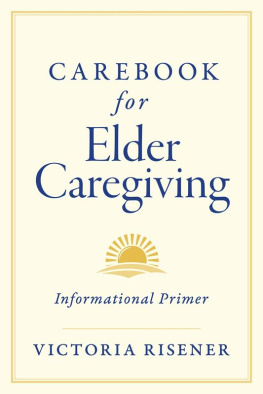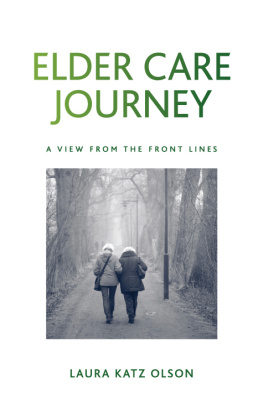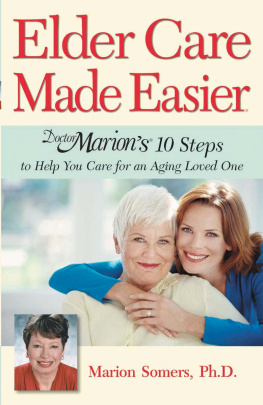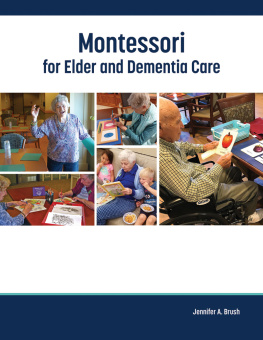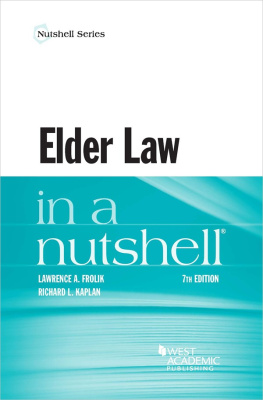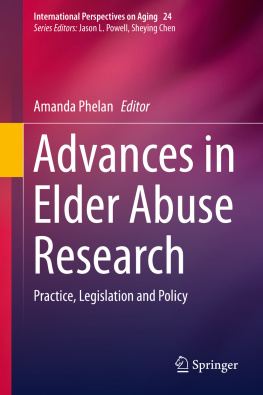
COPYRIGHT 2014 Victoria Risener. ALL RIGHTS RESERVED.
About the Author:
Vicki Risener, P.E.-retired
Although a retired mechanical engineer, Vickis information and experience comes from being the Daily Caregiver for her parents and learning the necessary parts of life care for the elderly thru to the end of life cycle.
Many blessings come from being a caregiver along with more things to do and think about for their care. A few hours to start to 24 hours and 7 days a week, and learning more about things you never wanted to know let alone sign up for.
ISBN: 9781483545318
ALL RIGHTS RESERVED
Reproduction or promulgation of this e-book in any form is strictly prohibited, including mechanical, digital, photocopying or recording by any informational storage or retrieval mechanism without the authors signed and dated authorization.
This publication is not to be passed to a third party or to upload it to pirate sites or any website. Offenders will have their license to use the e-book revoked, access rescinded without refund, and will face possible prosecution.
TABLE OF CONTENTS
DISCLAIMER AND/OR LEGAL NOTICES
The information contained within this publication expresses the opinions of the author at the date of this publication.
As the internet changes at a rapid rate, the author reserves the right to modify and update opinions based on those changes and conditions.
This e-book is for informational purposes only and the author does not accept any responsibility for any liabilities resulting from the use of this information. Every attempt has been made to verify the information provided and any referrals cannot assume any responsibility for errors, inaccuracies or omissions. Any slights of organizations, people, or references are unintentional.
All product names, logos, and trademarks are the property of their respective owners and are not necessarily endorsed, sponsored, or approved this publication.
Images and text used in this manuscript available over the internet may be subject to intellectual rights and may not be copied from this book.
INTRODUCTION:
Prepared for life changes for the elder generation and how to deal with them? Too old to be young and too young to be old, just needing a little assistance now and then to stay active and involved? Whos nominated to help and what does it mean to be a Caregiver?
The internet has become a major information vehicle of choice by persons of all ages. But what information do we need to be a Caregiver? Its a journey from companionship through daily assistance to end of life cycles. The better prepared the Caregiver, the better the quality of life for the Caregiven. It truly is a puzzle, but being aware and understanding the facets involved make the pathway clear.
The following is offered to assist you in putting all the puzzle pieces together:
- Cares and Concerns of the Caregiver
- Initial Preparation
- Home Preparation
- Financial Affairs
- Legal Affairs
- Health Care Programs
- Services
- Resources
- Activities and Hobbies
- Helpful Informational Sheets
Throughout your journey as a Caregiver conditions and needs change. If you are prepared for those changes the transitions will be easier. Take it one step at a time and
DONT DO DISCOURAGED : DO DETERMINED!
1.0 CARES AND CONCERNS OF THE CAREGIVER
Caregivers are the people involved in the care of an individual who requires assistance in their daily life due to accident or the aging process or debilitating diseases. Although this could be someone of any age and most of the information herein will apply to their care, this book is intended more for the care of the elderly.
The definition of a Primary Caregiver is normally thought to be the patients physician. However, based on experience, I believe there are two primary Caregivers medical physician and the daily Caregiver.
The daily Caregiver is thought to be responsible for the daily medical and dietary care of someone and is usually a spouse, adult child or relative who can take on the daily care and assistance without payment for services.
Other Caregivers are usually other family members, doctors, or those named by a court of law to administer the welfare of an incapacitated individual on a permanent or temporary basis. These individuals may be a primary Caregiver, but usually are the financial coordinator authorized to act on behalf of the individual should the need arise.
The role of a Caregiver is one of constant change, as the needs change for the better or the worse. The relationship of one to the other is very important as the patient must realize the Caregiver is there to assist and not to serve. The Caregiver should allow the patient to be as active and self-sufficient as possible for as long as possible in all their daily activities and business affairs.
The Initial Preparation is really three parts: Family Preparation; Emotional Preparation; and Physical Demands. The other concerns for the team are Home Preparation; Financial Affairs; Legal Affairs; Health Care Programs; Services; Resources and Activities and Hobbies. All are part at some time in Caregiving. It will take a team effort and cooperation to make it all work together and no one person can handle it all.
2.0 INITIAL PREPARATION:
There are three major parts to initial preparation: Family; Emotional; and Physical.
- Family Preparations may seem unnecessary, but the family is the one entity that has to realize and accept the changes and transitions a loved one is about to make. The family must realize that the Caregiver, if not already a family member, essentially becomes a member of the family. They are there to assist and are not household servants. As health conditions change, the family must adapt, and be willing to assist as much as possible, if only in cooperation and possible limited access. Visits are important for the morale of everyone.
Family members should not try to give orders to the Caregiver for care regimen unless they are prepared to take over the responsibility of the daily care should the need arise. (That means that the one who had been dealing with everything and everybody says I Quit! and that means the one giving criticism becomes elected to do the job by default. )
Family members should remember that most patients are excellent actors and actresses and can appear better or worse than their actual condition, depending on what they want believed. Watch for game-playing of family against the Caregiver. It Happens.!
The Caregiven, Family and Caregiver should sit down and discuss the existing conditions, how things are to be handled, and the wishes of the individual for end of life decisions. This Care management Team should follow those wishes if possible whether they agree with them or not.
Remember it should be a team effort to keep things open.
- Emotional Demands cannot really be anticipated, but only handled as required. Both the Caregiver and the Caregiven will experience changeable emotions based on the situation and the events of the hour. The roles tend to change into the Caregiver becoming the parental figure. At all times, the Caregiven must be given the proper respect and attention to maintain self-esteem. They have not become children, so dont treat them as such. (Sometimes easier said than done, but thats the goal!)
The better you know the personalities, moods and attitudes, the better prepared to deal with the emotional swings. The even-tempered and up-beat patient is easy to assist. Those who are not are a major challenge and more difficult to handle. If you as the Caregiver cant handle the psychological pressure dont take on the effort, it only gets more difficult as conditions change and your involvement increases. However, if you have no other choice, find a way to deal with it and find an outlet for the frustration. Do not take it out on the patient. Elder Abuse is against the Law.
Next page
